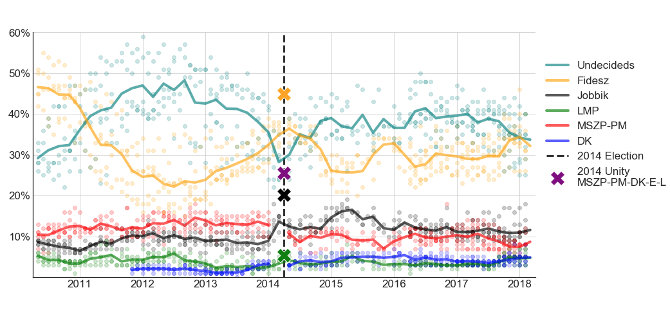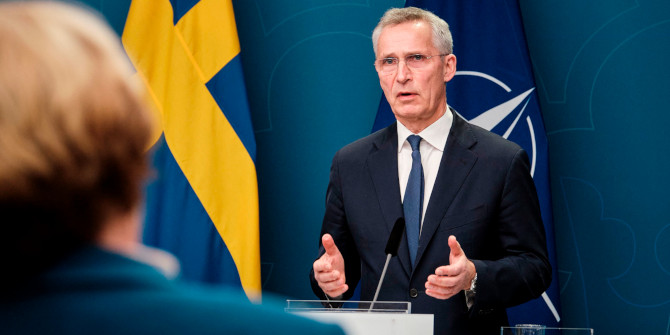 Poland has taken one of the strongest lines against Russia during the Ukraine crisis. Edyta Materka argues, however, that some of the key elements in Poland’s wider foreign policy strategy have had a negative impact on Polish citizens. She writes that both Poland’s agreement to host a missile defence project as part of an alliance with the United States, and the country’s exploration of shale gas as an alternative to Russian gas imports, have come at the expense of the interests of citizens located in the affected areas.
Poland has taken one of the strongest lines against Russia during the Ukraine crisis. Edyta Materka argues, however, that some of the key elements in Poland’s wider foreign policy strategy have had a negative impact on Polish citizens. She writes that both Poland’s agreement to host a missile defence project as part of an alliance with the United States, and the country’s exploration of shale gas as an alternative to Russian gas imports, have come at the expense of the interests of citizens located in the affected areas.
Polish Prime Minister Donald Tusk’s appointment as the European Council President has been viewed as a major opportunity for Poland to create an energy union that will align European countries in solidarity against Russia’s dominance over European energy markets. Poland’s own shale gas revolution has suffered setbacks after ExxonMobil, Marathon Oil, Talisman, and Total pulled out of their fracking concessions starting in 2012.
The country still imports about 60 per cent of its gas from Russia. Since Gazprom sets higher gas prices for countries that question Russia’s policies, Poland now pays some of the highest gas prices in Europe: about $500 per 1,000 cubic metres (Germany pays $370). An energy union would introduce common purchasing from buyers, though it may take years before such a union could pose formidable sanctions against, for example, Russia’s fast-moving military incursions into Eastern Europe.
Is Poland paying a democratic price for allying with the United States?
Poland’s energy dependency does not bode well for its aspirations to become a regional military leader against Russia in its ex-Soviet backyard. Critical of Europe’s slow response to impose sanctions on Russia’s annexation of Crimea, Poland is now juggling NATO and US military partnerships to militarise its borders. As of October 2014, 12,500 NATO and Polish troops have already begun ‘Anakonda’ military exercises in Orzysz in northern Poland, only 135 kilometres south of Kaliningrad oblast – a Russian exclave in the Baltic region with which Poland currently shares a ‘visa-free’, open border.
In September 2014, the US commenced the long-awaited construction of the SM-3 missile interceptor site in Rędzikowo, an ex-Soviet airstrip in northern Poland near the Baltic coast. While the US had assured Russia that the site would intercept missiles from Iran and North Korea, US Secretary of Defense Chuck Hagel recently claimed that the missile plan may need to be adjusted in the wake of the Ukraine-Russia conflict. Evolving US-Russian relations complicate Poland’s security – if Russia fears that it will be targeted by the US then Poland could become Russia’s target.

The Polish-US partnership, which Polish Foreign Minister Radosław Sikorski claimed in January is ‘worthless’, has hurt Poland’s democratic brand, hard-won by the Solidarity Movement. In July, the European Court of Human Rights ruled that Poland had violated human rights by hosting a CIA ‘black site’ in the Stare Kiejkutyair-base (also in northern Poland) where suspected terrorists were tortured and interrogated.
That same month, the European Commission began legal proceedings against Poland for breaching EU law in amending national law to allow for American-style shale gas drilling at 5,000 metres without first assessing the environmental impact of fracking on Polish land. For years, the Polish government produced and supported only pro-fracking data and passed a mining law in 2011 that allowed concession holders to expropriate private property and take owners who barred them from their land to court.
Similar injustices are occurring around the US construction of the missile site in Rędzikowo and its neighboring city, Słupsk. In October, a civil society group called the Association of Friends of Słupsk and the Region (SPSR) sent a protest letterto Prime Minister Ewa Kopacz indicating that ‘the existing information does not meet… any standards of democratic countries’. They claim that the government covered up the existence of anti-missile protests across Słupsk and Warsaw: ‘The vast majority of citizens spoke out against the creation of a missile defense shield in Redzikowo […] The closer to Słupsk, the opposition was greater’.
A CBOS poll from February 2008 shows that only 33 per cent of Poles supported its construction. Even the Słupsk city government rejected the plan. They vehemently dispute a letter written by Undersecretary of State Boguslaw Winid in which he claimed that during a 2008 meeting in Słupsk between Prime Minister Donald Tusk, local authorities and the general public, ‘information about the planned construction of the base in Rędzikowo was not met with any resistance’. SPSR claims that the construction of the missile base without the public support was undemocratic and breaks Articles 2 and 4 – which state that power lies in public hands – of the Polish Constitution. They warn that government inaction ‘will stimulate intensified social movements, which will hinder the construction of the American missile defense system’.
Reporter Hubert Bierndgarski, who has been covering the story since 2008, writes that to this day, ‘No one is informing the local community about the development plans’. Instead of coming to talk to Słupsk or Rędzikowo about the missile base, the US ambassador to Poland Stephen D. Mull in August 2013 took questions in the seaside town of Darłowo. Local media has also been kept in the dark. A missile site conference held in Warsaw in 2013 allowed only two national newspapers, no local media or local government representatives. After a failed attempt to set up a meeting between locals and the Ministry of National Defense (MON), Senator Kazimierz Kleina, claimed that ‘They feel ignored in the negotiation process about the construction of the base’. Residents – many who live in poverty and just want internal heating installed in their homes – feel like they are collateral, not people. ‘So when a war begins now, we will be the first to be wiped off the map, but at least America will be safe’, one local commented online.
Following the rollback of the state from the region after 1989, the prospect of an American presence has seen a return of state planning at the expense of private enterprise. The land market and city development projects (even a bike path) that would enhance the quality of life for residents have all been frozen since 2008, while nationally-funded highway construction projects continue at full-throttle. Słupsk mayor Barbara Dykier claims that there will be a 1.5 kilometre safety buffer zone around Rędzikowo, with buildings no higher than 10 metres allowed to be at the perimeter, and buildings no higher than 50 metres at the 4 kilometre perimeter.
Rędzikowians fear that they will be forcibly resettled. Recently, a private bid to buy state land across from Rędzikowo and transform it into a large wind farm fell through because they would not meet this metric requirement. Poland wanted the shale gas revolution to wean itself off of Russian gas, but its support of the American interceptor site actually exacerbates its energy dependency problem. Anti-Americanism has flared in this area since 2008 as villagers and their families in and around Rędzikowo have endured the dual processes of being economically marginalised at the heart of the shale gas revolution and becoming a global military target.
Poland is rushing to become an economic and military power in the region at the expense of its land rights, and environmental rights record. With the rise of Donald Tusk, it is unlikely that the very European institutions that residents in northern Poland have hoped would further check the Polish government’s infringements on their rights will happen anytime soon.
As Poland ramps up its European profile with the European Council presidency and its regional profile as a military player, it should think long and hard about what brand of democracy it wants to support. The aim should be that in the process of scaling up its policy interests, its environmental and democratic records are a model for, not mirror of, Putin’s Russia. The first order of business would be to truly listen to, not trample upon or ignore the voices of its own citizens. As previous experience suggests, not listening to its own citizens will eventually catch up with Poland.
Please read our comments policy before commenting.
Note: This article gives the views of the author, and not the position of EUROPP – European Politics and Policy, nor of the London School of Economics.
Shortened URL for this post: http://bit.ly/1DYOV5f
_________________________________
 Edyta Materka – Harvard University
Edyta Materka – Harvard University
Edyta Materka received her PhD in Human Geography and Urban Studies at the London School of Economics in 2014 and is currently a Postdoctoral Fellow at Harvard University’s Davis Center for Russian & Eurasian Studies. She is writing a book about the informal economy of kombinacja in northern Poland from 1945 to the present.





